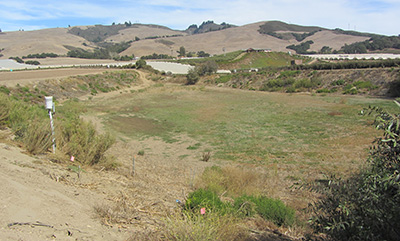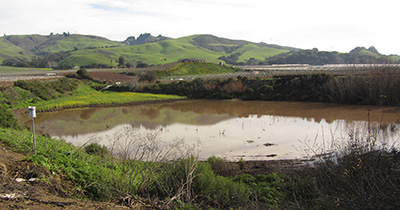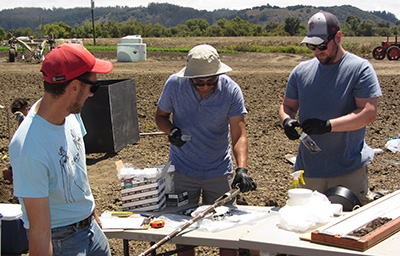Campus News
Moore Foundation grant funds UC Santa Cruz groundwater sustainability project
The $854,000 grant supports research and solutions for the sustainability of groundwater in California.



A team of faculty and students at UC Santa Cruz has received a grant of $854,000 from the Gordon and Betty Moore Foundation for a groundwater sustainability project that involves managing runoff from storms to recharge groundwater supplies. The grant supports efforts to link the infiltration of surface water into the ground with improvements in water quality.
Andrew Fisher, professor of Earth and planetary sciences, and Chad Saltikov, professor and chair of microbiology and environmental toxicology, are the principal investigators for the three-year project, which builds on a pilot study funded by the UC Water Security and Sustainability Research Initiative (UC Water) and the U.S. Environmental Protection Agency. For the past two years, Fisher, Saltikov, and their students and collaborators have been working to understand how microbes living in soil might contribute to water quality improvements as surface water becomes groundwater.
In addition to extending this research, the new project will connect with a regional effort, launched in October 2016, to increase and improve groundwater supplies by providing incentives for landowners to collect stormwater in “recharge ponds” for infiltration into aquifers. The UCSC researchers are collaborating with the Resource Conservation District (RCD) of Santa Cruz County and the Pajaro Valley Water Management Agency (PVWMA) as part of this new Recharge Net Metering program.
“The program helps to offset costs for landowners if they place successful infiltration and recharge projects on their properties. With this new grant, we can focus on development and application of practices that can help to achieve simultaneous improvements to water supply and quality,” said Fisher, who has been studying groundwater issues in the Pajaro Valley for nearly 20 years.
Beneficial microbes
In recent years, Fisher has focused on identifying the best sites for recharge ponds and helping to design, install, and test the performance of groundwater recharge systems. Saltikov is an expert in microbial processes that control the fate and transport of contaminants in the environment. Field experiments run by Fisher, Saltikov and their team in 2015 and 2016 have explored how materials added to soils can help to stimulate beneficial microbial activity.
“The microbes that live in the soil can be enlisted as allies, helping to clean the water as it flows in from the surface and becomes groundwater,” Saltikov explained. “The integration of next-generation DNA sequencing technology with hydrologic lab and field studies will give us a new and powerful approach for understanding how water percolating into the ground is influenced by microbes living in the soil.”
Fisher has been working with RCD and PVWMA partners to raise state and federal funding to build stormwater collection and infiltration systems, and to find locations where these systems are most likely to work. Each stormwater project is intended to generate at least 100 acre-feet per year of infiltration benefit. An “acre-foot” is equivalent to one foot of water covering one acre of land, about enough water to meet the needs of two families of four for a year.
The PVWMA will provide rebates to offset landowner costs for operation and maintenance of these stormwater systems. The remaining piece that had been missing was funding for evaluation of project effectiveness and for research to figure out how to make the projects work better and create multiple benefits.
“We are thrilled to be supported by the Gordon and Betty Moore Foundation, which funds cutting-edge scientific research and wants to see results transferred from the lab to common practice,” said Fisher.
Sustainable groundwater management
The timing of this project is ideal, he said, as California recently enacted the Sustainable Groundwater Management Act (SGMA), the first statewide legislation for managing groundwater in California’s history. Groundwater basins around the state are scrambling to organize new agencies and develop management plans, including “best practices” that can be applied to achieve long-term sustainability goals.
“This is a once-in-a-life-time opportunity to change the way critical water resources are viewed and managed, and this part of the state is ahead in many ways in terms of developing and adopting innovative methods,” Fisher said.
Each infiltration system is different, and what works in one place might not work in another. With this grant, Fisher, Saltikov, and their students and partners hope to learn how and why different soils are more or less effective in creating cleaner groundwater. This will make it easier to select appropriate sites and practices and to make sure that valuable resources are used in ways that provide benefits to the environment and support farms and cities.
The Gordon and Betty Moore Foundation fosters path-breaking scientific discovery, environmental conservation, patient care improvements, and preservation of the special character of the Bay Area. More information is available online at moore.org.